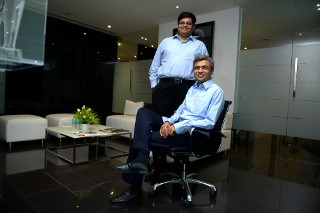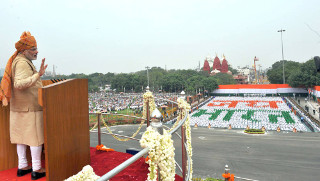[This allegorical woodcut shows Rhetoric enthroned between Prudence and Invention. By Anonymous (Public domain), via Wikimedia Commons]
Dear friend,
I had the pleasure of attending two sessions at Bangalore Literature Festival held recently. One of them was on Aadhaar. It had fantastic panellists: Arun Maira, former Planning Commission member, Jairam Ramesh, former minister, and Sanjay Jain, former executive at UIDAI. It was moderated by my colleague Charles Assisi. The topic—‘Aadhaar: Dystopia or Utopia’—seemed to highlight the impression that the debates around Aadhaar have become irrevocably polarised.
If your main sources of information on Aadhaar happen to be social media and television you will in fact believe that to be the case. You will see that the boundaries are clearly drawn around pro-Aadhaar and anti-Aadhaar groups. You will see them questioning each other’s integrity and sanity. You will see them trading insults. In her 2014 book, Political Insults, George Mason University professor Karina Korostelina warns us that insults can escalate to conflicts. You will see that many social dynamics that Korostelina elaborated in her book—transfer of insult, sensitising, generalisation—are at play in these social media circles. And so, you will be worried.
I have good news to share. Fortunately, this kind of polarisation seems to be limited to a fairly small set of people. The rest are neither rushing to the roads waving Aadhaar flags in support, nor are they shaking in fear. Most people whom I have interacted with in the past several months seem to be looking at it the way one would approach buying a car or a house—with caution. They are exploring. They are listening to both sides, often with a jar of salt next to them. We often ignore their voices, because they are not loud.
I saw quite of a few of them at the Bangalore Lit Fest, and at one point, I turned my attention away from the stage, and walked around to get a sense of the audience. They seemed to be deeply engaged. Luckily, we have the video recording, and I would urge you to watch it. It’s about 45 minutes.
Charles kept field notes on the event too, and backed it up with conversations with his fellow speakers including novelist Manu Joseph and JNU professor Makarand Paranjape. Do read.
Do read, and let us know what you think. And subscribe to the newsletter if you haven’t already.
Regards,
NS Ramnath
On behalf of Team Founding Fuel
Featured Stories
Aadhaar and the Buddha's Middle Path
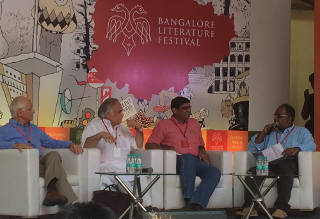
A panel discussion with Arun Maira, former Planning Commission member, Jairam Ramesh, former union minister and Sanjay Jain, former technology executive at UIDAI. (Moderated by Charles Assisi. Play Time: 47 mins)
Aadhaar and the Arnab Monologues
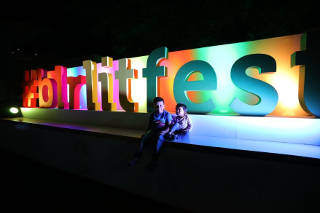
[Photograph courtesy bangaloreliteraturefestival.org]
Pointers to contemporary politics, different kinds of critics, media narratives and why writing is a bad idea from a literature festival. (By Charles Assisi. Read Time: 13 mins)
Change is possible for public education in India. Azim Premji shows how
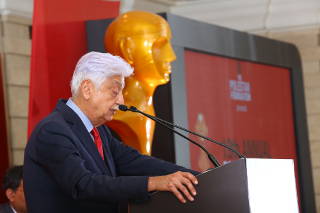
In his keynote speech at the 19th Polestar Awards function, an annual award for excellence in journalism, Azim Premji draws on his vast experience in education and philanthropy to talk about what needs to be done to improve public education in India. (By Founding Fuel. Read Time: 8 mins)
What We Are Reading
How the Great Recession changed banking
Banks hampered by tight technology budgets, overly rigid organisational structures, and competing internal visions of the future will risk stagnation—or worse. (By Christian Edelmann and Patrick Hunt)
The economics of the office: Why do we still commute?
The personal computer was supposed to kill the office and liberate us from hellish commutes to the city. But the average American commute has only increased since then. Could virtual reality finally change that? (By Greg Rosalsky)
‘We can’t compete’: Why universities are losing their best AI scientists
A handful of companies are luring away top researchers, but academics say they are killing the geese that lay the golden eggs. (By Ian Sample)
From Our Archives
The new traditionals
[Photograph Familia Ojeda by Ojedamd under Creative Commons]
Family managed businesses run the risk of being run over by their more contemporary counterparts. If they adhere to some ground rules though, they can come up trumps. (By Harsh Vardhan)
Rajesh Patil is building a different kind of real estate firm—and reaping the rewards
[Photograph: Rajesh Patil (seated) & Sujay Kalele by Abhijit Bhatlekar of Mint]
The maverick chairman of leading Pune-based realtor Kolte-Patil Developers is scripting a transformation story that’s turned every known precept on its head and made him an outcast in his own industry. (By Indrajit Gupta)
Indian innovation: Too much Valley Kool-Aid without the Valley
[Photograph courtesy PIB]
Indian innovation and entrepreneurship suffer because they rely too much on the Silicon Valley model without the Valley's infrastructure and ethos. (By Baba Prasad)



